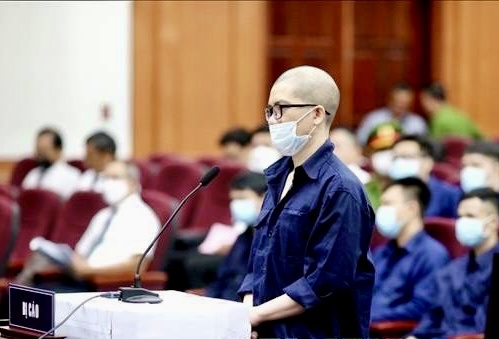 Society
Society

 |
| Chairman of Alibaba Company Nguyễn Thái Luyện, 37, at the HCM City People’s Court appeals trial on Friday. — VNA/VNS Photo |
HCM CITY — The HCM City People’s Court on Friday rejected appeals of the chairman of Alibaba Company, leaving unchanged his sentence of life in prison for property fraud, causing more than 4,500 victims to lose over VNĐ2.4 trillion (US$103.3 million).
At the appeals trial of Nguyễn Thái Luyện, 37, who is the case’s mastermind, and other company’s employees, the court changed his wife Võ Thị Thanh Mai’s sentence to 23 years, down from 30 years, for property fraud and money laundering.
Other defendants received between 11 and 21 years, down by several years, for property fraud.
In addition, the court also ordered Luyện and his wife to pay 4,550 victims VNĐ2.4 trillion in compensation.
After the first trial ended last December, 18 out of 23 defendants appealed. Three of them later withdrew their appeals.
Along with other defendants, Luyện has repeatedly said he did not commit property fraud and that the company did not lie when providing information about the land plots for sale to customers.
The court delayed the appeals trial in March due to the absence of a number of defense attorneys.
According to the indictment, Luyện and his accomplices counterfeited residential projects, illegally divided and separated land plots in Đồng Nai, Bà Rịa-Vũng Tàu and Bình Thuận provinces and sold them to thousands of people to illegally appropriate VNĐ2.4 trillion.
Luyện assigned his relatives and 2,600 trusted employees to act as legal entities of these companies to illegally appropriate property.
To create trust and attract customers, Luyện promised to buy back the land at prices 30 per cent higher after 12 months or 38 per cent higher after 15 months from the date of payment.
He also told purchasers that they could rent the land back for 2 per cent per month from the date of signing if the customers paid 95 per cent of the contract value.
With this method, most customers who received land transfers in the form of residential plots offered by the company did not receive the certificates of land use rights. Instead, the company paid interest or repurchased the land according to options contracts or attached contract addendums.
According to the court, Alibaba Company was not permitted to divide and separate land plots, and the land was not residential as advertised by the company. The offering of options or attached contract addendums was a means of luring people to the projects. — VNS